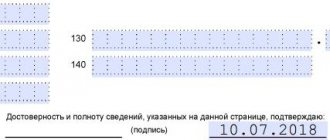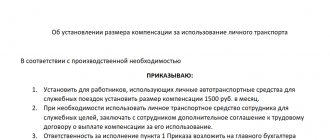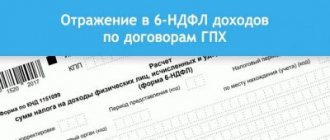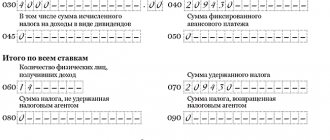In what cases may it be necessary to recalculate vacation pay?
The calculation of an employee's rest payment is based on the amount of average daily earnings and the number of vacation days.
It is logical that their change will inevitably affect not only the amount due to the employee, but also income tax. Find out how to correctly reflect an employee’s vacation in reporting in the article “How to correctly reflect vacation pay in Form 6-NDFL?”
Here are the main situations in which recalculation of vacation pay is inevitable:
- Error when calculating vacation pay or average earnings.
- Additional accruals of wages that occurred after the start of the vacation (for example, a bonus was paid for the previous year).
- Making a decision to increase staff salaries after the employee starts resting.
- Employee illness while on vacation.
- Recall from vacation due to production needs.
EXAMPLE from ConsultantPlus: 6-NDFL with additional payment of vacation pay. The employee went on vacation for 28 days from 06/05/2020. Vacation pay was paid on June 1, 2020, and personal income tax was transferred at the same time. 07/03/2020 the employee was paid additional vacation pay - 2,900 rubles.... Read the continuation of the example after receiving trial demo access to the K+ system. It's free.
Let's consider how to correctly reflect such changes in form 6-NDFL.
The company employs foreigners with a patent
The company employs Russian citizens and foreign patent employees. The company withholds personal income tax on all income at a rate of 13 percent.
The salaries of residents and foreigners on patent are subject to personal income tax at a rate of 13 percent. This rate is established by different standards. For residents' salaries - clause 1 of Article 224 of the Tax Code of the Russian Federation. And for foreigners - paragraph 3 of Article 224 of the Tax Code of the Russian Federation. Because of this, the tax authorities do not require you to fill out several blocks with a rate of 13 percent. The company has the right to show all income in one line 010–050.
For example
B - 7 resident employees and 5 foreigners with a patent. She did not reduce the calculated tax on advances for the patent. For the first half of the year, the company accrued income to foreigners - 630,000 rubles, calculated and withheld personal income tax - 81,900 rubles. (RUB 630,000 × 13%). She accrued income to residents - 940,000 rubles, calculated and withheld personal income tax - 122,200 rubles. (RUB 940,000 × 13%). The company recorded the income of foreigners and residents in one block of lines 010–050. In line 020 - 1,570,000 rubles. (630,000 + 940,000), in lines 040 and 070 - 204,100 rubles. (81,900 + 122,200). The company filled out Section 1 as in sample 94.
Sample 94. How to reflect the income of foreigners and residents in the calculation:
The company reduces the calculated personal income tax on advances for a patent
The company employs a foreigner with a patent. Every month the company reduced the calculated personal income tax by the advances that the employee paid for the patent.
The employer has the right to reduce the personal income tax of foreigners for the advances they paid for the patent (clause 6 of article 227.1 of the Tax Code of the Russian Federation). To do this, you need to receive a notification from the inspectorate.
In line 020, write down the accrued income, and in line 040, the calculated personal income tax. The company reflects advances in line 050 of the calculation, and in line 070 the difference between the calculated personal income tax and advances. The difference cannot be negative. If a foreigner’s tax for the quarter is less than he paid for the patent, then the company reduces personal income tax only by part of the advances. Therefore, in line 050, write down only those advances for which personal income tax was actually reduced.
Even if the company did not withhold anything from the foreigner, reflect the salary in section 2. In line 130, show the accrued income, and in line 140 put zero.
For example
The company employs two foreigners with a patent. Every month they pay advances for the patent - 4,200 rubles. The salary of the first employee is 30,000 rubles. per month, personal income tax - 3900 rubles. (30,000 rubles × 13%), second - 32,000 rubles, personal income tax - 4160 rubles. (RUB 32,000 × 13%). Salary taxes are less than monthly advances, so the company does not withhold personal income tax.
Section 1.
During the six months, the company accrued income of 372,000 rubles. ((RUB 30,000 + RUB 32,000) × 6 months). Calculated personal income tax - 48,360 rubles. (RUB 372,000 × 13%). Advances for a patent for 6 months amounted to 50,400 rubles. (RUB 4,200 × 2 × 6 months). In line 050, the company recorded advances within the calculated tax - 48,360 rubles.
Section 2.
The company issued salaries for April on May 4 - 62,000 rubles. (30,000 + 32,000). Calculated personal income tax - 8060 rubles. (3900 + 4160). The company did not withhold tax. She filled out the calculation as in sample 95.
Sample 95. How to fill in the income of foreigners on a patent:
3. The foreigner became a resident in the second quarter
The company withheld personal income tax from the foreigner at a rate of 30 percent. He became a resident in the second quarter.
The income of non-residents is subject to personal income tax at a rate of 30 percent (clause 3 of article 224 of the Tax Code of the Russian Federation). But if an employee has spent 183 calendar days in Russia over the past 12 months, he will become a resident. Tax for the month in which the employee became a resident will need to be calculated at a rate of 13 percent. The company determines the employee’s status at the end of each month (letter of the Federal Tax Service of Russia dated October 22, 2014 No. OA-3-17/ [email protected] ).
Semi-annual calculation.
Do not recalculate the tax for previous months, because the employee can still become a non-resident. In section 1, show the employee’s income in two blocks of lines 010–050 - at a rate of 30 and 13 percent.
Calculation for nine months and for a year.
The company determines the final status of the employee based on the results of the year. At the same time, if during the year an employee stays in the Russian Federation for 183 calendar days, then his status will not change until the end of the year. This will happen in July. This means that this month you can recalculate personal income tax on all income from January to June (letter of the Ministry of Finance of Russia dated February 15, 2016 No. 03-04-06/7958).
Thus, all employee income will be taxed at a rate of 13 percent. When calculating for nine months and for a year, do not divide payments at different rates. In line 040, reflect the tax calculated at a rate of 13 percent. And in line 070 - personal income tax, which was actually withheld from the employee. The company does not have the right, after recalculation, to return money to the employee upon application. Show the overpayment in the 2-NDFL certificate as excessively withheld.
For example
The foreigner arrived in Russia on December 15. The following June he became a resident. The company calculated personal income tax on wages for this month at a rate of 13 percent. On income for January - May - at a rate of 30 percent. Salary for January - May - 450,000 rubles, calculated and withheld personal income tax - 135,000 rubles. (RUB 450,000 × 30%). Salary for June - 50,000 rubles, calculated and withheld personal income tax - 6,500 rubles. (RUB 50,000 × 13%). There are no other employees in the company. Total income - 500,000 rubles. (450,000 + 50,000). Personal income tax - 141,500 rubles. (135,000 + 6500). She filled out section 1 as in sample 96.
Sample 96. How to fill out the half-year calculation if the employee has become a resident:
The company provides deductions to the foreigner and reduces personal income tax on advances
The company employs a foreigner with a patent. He is a resident of the Russian Federation. The company provides him with a child deduction and reduces his calculated personal income tax by advances for the patent.
Foreigners with a patent have the right to receive a child deduction as soon as they become residents of Russia. To receive deductions, a foreigner must write an application and bring birth certificates of children. If the documents are in a foreign language, they must be translated and the translation certified by a notary.
The company has the right to provide a deduction to a foreigner and at the same time reduce the calculated personal income tax for advances for a patent. The Code does not prohibit this. First, reduce the foreigner’s income by deductions and calculate personal income tax. This amount can be reduced by advances.
In line 020, write down the accrued salary. Reflect the deductions that were provided to the employee in line 030 of section 1. And the advances for which the calculated personal income tax was reduced are reflected in line 050. In line 070 reflect the personal income tax that was withheld from the employee.
As for section 2, reflect the operation in it, even if the advances exceeded the calculated personal income tax. On line 130, record accrued income. And in line 140 - withheld personal income tax. If the company did not withhold anything, enter a zero on this line.
For example
The company employs a foreigner with a patent. Pays a monthly advance of 4,200 rubles. The employee's salary is 50,000 rubles. He has one child, so the company provides a deduction of 1,400 rubles. The company issued salaries for April on May 5. Calculated personal income tax - 6318 rubles. ((RUB 50,000 - RUB 1,400) × 13%). And I withheld tax minus the advance payment - 2118 rubles. (6318 - 4200). The company filled out Section 2 as in sample 97.
Sample 97. How to reflect salary if the company reduced income by deductions:
The company pays a non-resident for work outside the Russian Federation
A foreigner works remotely for the company. He is a non-resident and does not come to Russia from his country.
Personal income tax is assessed on income from sources in Russia (Clause 1, Article 207 of the Tax Code of the Russian Federation). If an employee works remotely from another country, he receives income from sources outside the Russian Federation. This means that there is no need to withhold tax on payments to this employee (letters from the Ministry of Finance of Russia dated 03/31/14 No. 03-04-06/14026, dated 07/15/15 No. 03-04-06/40525). The “physicist” himself will report his income and pay tax in the country where he lives.
In 6-NDFL, the company reflects payments for which it is a tax agent (clause 2 of Article 230 of the Tax Code of the Russian Federation). Therefore, do not reflect the income of a foreigner working remotely in 6-NDFL.
For example
The company employs a foreigner from Germany. He works remotely from his country. During the six months, the company accrued income to the employee - 504,000 rubles. Personal income tax was not withheld. In addition, the company accrued income to 12 employees - 1,809,000 rubles, calculated and withheld personal income tax - 235,170 rubles. (RUB 1,809,000 × 13%). The company did not reflect the income of a foreigner in 6-NDFL. She filled out Section 1 of the half-year calculation as in sample 98.
Sample 98. How to fill out the calculation if the company employs foreigners remotely:
Top
Reflection of the recalculation of vacation pay in 6-NDFL due to a calculation error
Adjustments in the calculation of average monthly earnings can lead to both underestimation and overestimation of vacation pay paid and the tax withheld from them.
If, as a result of the recalculation, the amount of payments decreased, then, taking into account the requirements of the Procedure for filling out and submitting the 6-NDFL calculation, approved by order of the Federal Tax Service of the Russian Federation dated October 14, 2015 No. ММВ-7-11 / [email protected] (hereinafter referred to as the Procedure for filling out), from the tax agent you will need the following:
- Provide an update to 6-NDFL for the quarter in which the error was made, changing the indicators of accrued and received income, as well as calculated tax (lines 020, 040 and 130).
- In Form 6-NDFL for the quarter in which the tax was recalculated, it is necessary to reflect changes only in lines 070 and 140.
- If it is not possible to offset the overly withheld tax against upcoming payments, then the amount of tax returned to the individual in the recalculation quarter must be reflected in line 090.
- Neither the correction period nor the recalculation period changes the indicators on lines 100, 110 and 120.
IMPORTANT! For deductions from wages for reasons not listed in Art. 137 of the Labor Code of the Russian Federation, the written consent of the employee will be required.
Now consider the case of adjusting earnings for previous periods, which increased the amount of vacation pay. In this case, additional accruals of income and personal income tax are reflected in the recalculation period on lines 020, 040, 070, 130 and 140, and the additional payment of vacation pay will be income for the period in which it was made (subclause 1, clause 1, article 223 of the Tax Code of the Russian Federation ).
These conclusions are fully consistent with the position of the tax authorities .
Results
Recalculation of vacation pay requires a thorough analysis of the reasons and grounds for its implementation. In most cases, you can get by with changing the indicators of the 1st and 2nd sections of the 6-NDFL calculation for the current period, but if previous quarters were affected, then submitting updated calculations cannot be avoided.
For vacation pay, the date of receipt of income for the purposes of calculating personal income tax is the date of actual payment, and the date of payment of tax to the budget is the last day of the month. Therefore, vacation pay is reflected in section 2 of the 6-NDFL calculation separately.
The need to recalculate vacation pay after submitting reports may arise in two situations:
1. if an error was made when calculating vacation pay and incorrect data was included in the reporting (in this case, you must submit an updated 6-NDFL calculation with the correct information);
2. if there are statutory reasons (for example, recall of an employee from vacation, dismissal, postponement of vacation due to untimely payment of vacation pay).
If vacation pay was recalculated for the previous period and this led to a decrease in the amount of vacation payments and the tax calculated on them, then an updated calculation of 6-NDFL is submitted.
If the recalculation resulted in an additional payment amount, then the updated 6-NDFL calculation for the previous reporting (tax) period does not need to be submitted. The final amount based on the results of recalculation should be reflected in the calculation of 6-NDFL for the period in which such additional payment was actually made.
This is explained by the fact that distortion of reporting indicators will occur only if the amounts of payments and, accordingly, the amount of personal income tax calculated from them decrease.
Such explanations are given by the adviser of the department of organization of desk control of the department of desk control of the Federal Tax Service E.A. Kudryashov in the journal “Tax Policy and Practice”.
Extension of vacation will not affect 6-NDFL
In accordance with Art. 124 of the Labor Code of the Russian Federation, annual leave is subject to extension for the period of such circumstances as:
- illness confirmed by sick leave;
- performance of government duties, for the period of which a release from work is provided;
- other cases provided for by industry legislation or internal regulations.
In such cases, there will be no consequences for personal income tax accounting, since payment for all vacation days has already been made, and no recalculation is made. As for disability benefits, the amounts of income and personal income tax on sick pay are reflected in 6-NDFL in the period in which they were paid.
ConsultantPlus experts spoke in detail about the nuances of reflecting sick leave in 6-NDFL. Get free demo access to K+ and go to the Ready Solution to find out all the details of this procedure.
Upon agreement with the employee and in order to ensure the normal operation of the enterprise, vacation days unused due to illness or other reasons can be postponed to another date, and then the recalculation of vacation pay in 6-NDFL will be necessary.
What are standard deductions called and why are they recalculated?
Standard deductions (SD) are:
- established by art. 218 of the Tax Code of the Russian Federation, amounts that reduce the income received by an individual when determining the tax base for personal income tax;
- one of the types of tax deductions (along with social, property, etc.) used in calculating personal income tax.
Are deductions applicable when calculating other taxes? You will find the answer in the material “What are VAT tax deductions?” .
To receive SV, you must:
- receive income taxed with personal income tax at a rate of 13% (persons receiving only income exempt from personal income tax, or only income from dividends, or income taxed at other rates cannot apply for SV);
- be a resident for personal income tax purposes (stay in our country for more than 183 days for 12 consecutive months).
Indicated in Art. 218 of the Tax Code of the Russian Federation, deductions are fixed - established by tax legislation in fixed amounts depending on the category of taxpayer:
- 3,000 rub. — for Chernobyl victims, disabled people of the Second World War, etc.;
- 500 rub. — for heroes of Russia, former prisoners of concentration camps, etc.;
- 1,400, 3,000, 6,000, 12,000 rub. - “children’s” deductions.
It should be noted that receiving SV is an employee’s right:
- which he may not use or apply for it not from the beginning of the calendar year;
- which cannot be used in the absence of supporting documents and an application from the potential recipient of the deduction.
These reasons may serve as a reason to recalculate the SV. In addition, the need for recalculation may arise in other cases - for example, if an employee acquired resident status during the year or an error was identified in the calculations.
How to fill out 6-NDFL in cases of recalculation of personal income tax in connection with the erroneous provision of a standard deduction, as well as the return of personal income tax based on a notification confirming the right to a property deduction, the Ministry of Finance explained. Find out the opinion of officials in ConsultantPlus. To do everything right, get trial access to the K+ system and study the material for free.
We will tell you how to reflect the fact of recalculation of deductions in 6-NDFL in the next section.
We correct the report during a shortened vacation
When an employee leaves vacation ahead of schedule, as a rule, it is associated either with his illness during vacation, or with a recall due to production needs.
In both cases, the amounts of overpaid amounts and withheld personal income tax can be counted against other income for the reporting period. In the calculation of 6-NDFL, the method of adjustment will depend on the period in which the vacation interruption occurred.
If the employee’s vacation began and was interrupted in the same reporting period, then the amount of overpaid income in Section 2 of the report is counted as wages, and the amount of vacation pay is reflected taking into account the adjustment. But in the case when the recalculation affected the previous quarter, it is necessary to act similarly to the situation with the adjustment when reducing the amount of accrued income.
What payments are due upon termination of an employment contract?
The list of payments upon dismissal depends on the reason. In any case, the employee is paid:
- all wages up to the last day of work;
- compensation for unused vacation.
In the event of termination of an employment contract due to layoffs or health reasons, severance pay and retained earnings for the duration of employment are additionally paid. Upon termination of an employment contract, by agreement of the parties, severance pay is paid, if provided for in the employment agreement.
All settlements with the employee must be completed on the last day of his work. And transfer the personal income tax withheld from payments no later than the next day (clause 6 of Article 226 of the Tax Code of the Russian Federation).








